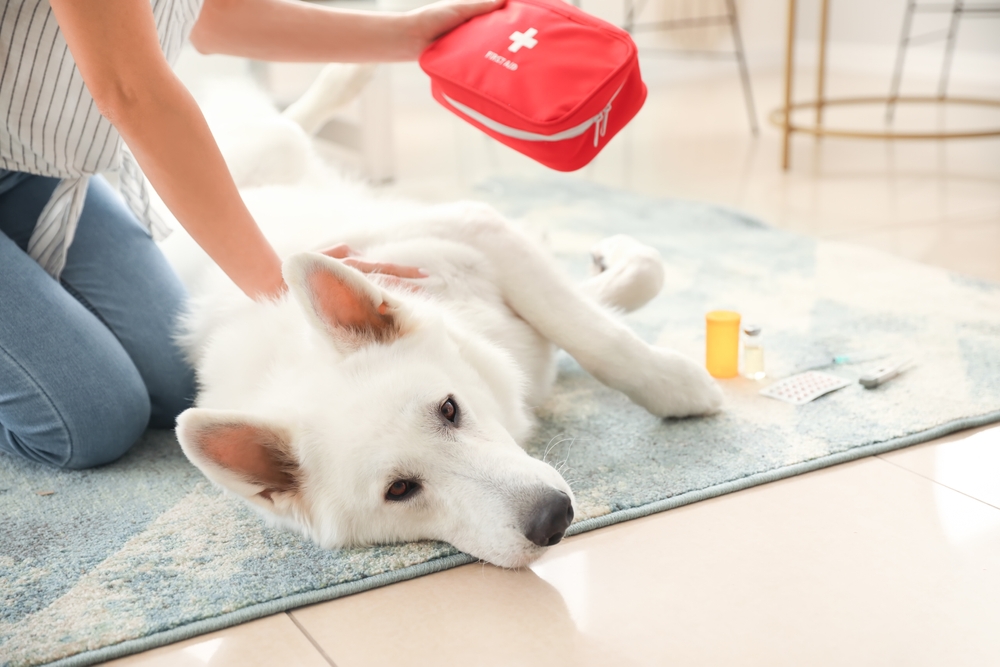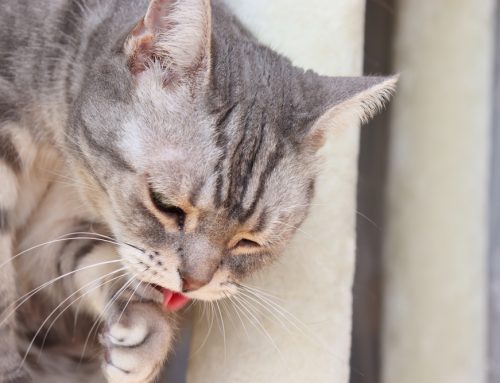Veterinary emergencies are a pet lover’s worst nightmare. Although the Tidmore Veterinary Hospital team is here for your pet in sickness and health, we would prefer that you never need us for unexpected reasons. Fortunately, you can avoid or minimize many common pet emergencies with supervision, caution, and preventive measures.
1: Pet-proof your home and yard
Your pet’s environment, if not pet-proofed, could be filled with everyday dangers such as toxins, electrocution or choking hazards, and escape opportunities. Get on your pet’s level to identify potential emergencies, and then take action to eliminate the risk. Common household risks include:
- Human medications
- Toxic foods
- Small objects and decor
- Electrical cords
- Poisonous plants
- Gaps or holes in fencing
- Unsecured doors and gates and open windows
- Rodent and insect bait
- Harmful chemicals such as antifreeze and household cleaners
2: Supervise your pet outdoors
Unsupervised pets—including those kept in fenced yards—are at risk for numerous outdoor emergencies. Monitoring your pet’s behavior and ideally restricting their movement with a leash, long line, or fenced area ensures you can intervene before your pet becomes injured, sick, or lost. If your cat likes going outside, build or purchase a safe enclosure (i.e., a catio), so they can experience the sights and smells of the great outdoors without risk. Finally, supervision protects your pet from devastating heatstroke, a fatal emergency that occurs rapidly in warm weather.
3: Feed your pet a healthy diet
A balanced diet promotes your pet’s health, but certain “people foods,” such as chocolate, raisins, grapes, onions, macadamia nuts, and xylitol, are toxic and can cause serious veterinary emergencies. Additionally, rich or unfamiliar foods can lead to pancreatitis, a potentially life-threatening condition that often occurs during the holidays when owners share their plates or pets get into the trash. To prevent food-related emergencies, stick to your pet’s regular diet and only give them treats and fresh whole foods approved by our veterinarian.
4: Stay current on your pet’s preventive care
Your pet’s routine veterinary care and exams at Tidmore Veterinary Hospital play a key role in preventing emergencies. Vaccines protect your pet from infectious diseases, while regular exams and screening tests allow our veterinarian to detect subtle health changes in your pet before they become life-threatening emergencies.
5: Train your pet
Training creates more than a well-behaved pet—it could save their life. Ensure your pet has a solid understanding of critical behaviors, including:
- Crate training
- “Come” or recall
- “Stay”
- Boundaries (i.e., waiting at thresholds or staying out of certain rooms)
- “Leave it”
- Leash walking
Training isn’t only for dogs! Cats also can be trained in these behaviors, as well as walking on a harness and leash for safe outdoor exploration. Keep sessions short and positive to ensure success.
6: Recognize common pet illness signs
Your pet’s behavior provides key information about their health and comfort. Being able to read your pet can potentially be life-saving when you know your pet needs prompt veterinary attention. Start by simply getting to know your pet’s daily routine and norms, such as how much they eat and drink, when they eliminate, their stool’s normal appearance, and their average energy levels. While some fluctuation is normal, especially as the seasons change, sudden uncharacteristic behavior can indicate pain or illness. Signs may include:
- Persistent vomiting and/or diarrhea
- Changes in breathing
- Weight loss
- Seizures or tremors
- “Pot-bellied” appearance
- Non-healing wounds
- Unusual weakness or fatigue
- Unexplained bleeding
- Lameness or swelling
- Lack of coordination
- Unusual gum color (e.g., pale pink, blue, purple, white)
- Changes in eating or drinking habits
- Hiding
- Unexplained aggression, irritability, or fearfulness
Seek prompt veterinary care if your pet demonstrates any of these signs or shows other concerning behavior. If your pet experiences an emergency event but appears normal, also seek immediate attention. Signs may not be immediately apparent.
7: Be prepared for pet emergencies

While many common pet emergencies can be prevented, knowing what to do after an unavoidable emergency can help minimize its impact and improve your pet’s prognosis. Create a basic emergency plan for your pet that includes:
- Resources — Emergencies rarely happen during normal business hours. Plan where you’ll take your pet for urgent or emergent after-hours veterinary care.
- First aid supplies — Assemble or purchase a pet first aid kit so you can treat minor emergencies at home. Never give your pet medication without veterinary approval.
- An emergency or evacuation kit — Severe weather events and unexpected local emergencies may force you to leave quickly with your pet. An emergency kit stocked with your pet’s rations, medications, water, and supplies can help you safely evacuate or shelter in place.
Everyday actions can prevent or minimize unexpected disasters. Follow these tips to significantly reduce your pet’s risk of common emergencies and ensure they stay healthy, happy, and safe. For additional resources or to schedule your pet’s next appointment, contact the Tidmore Veterinary Hospital team.








Leave A Comment